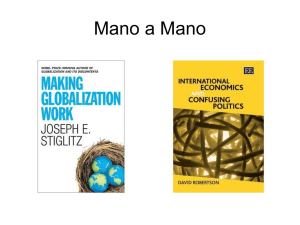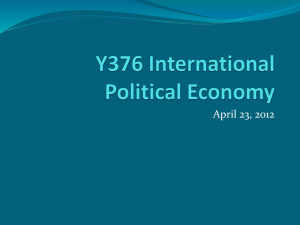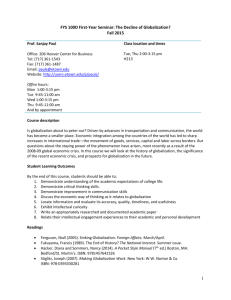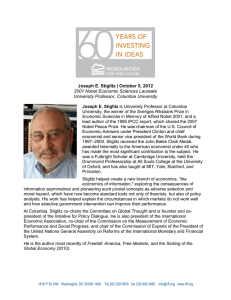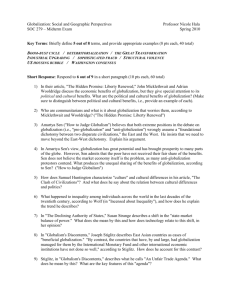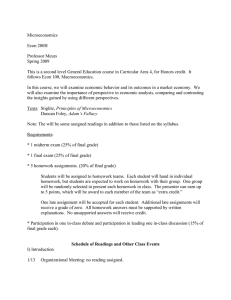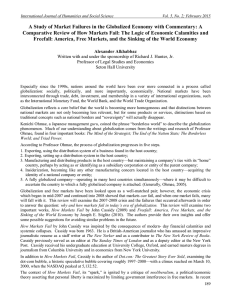Word - My E-town -- Personal Home Pages
advertisement
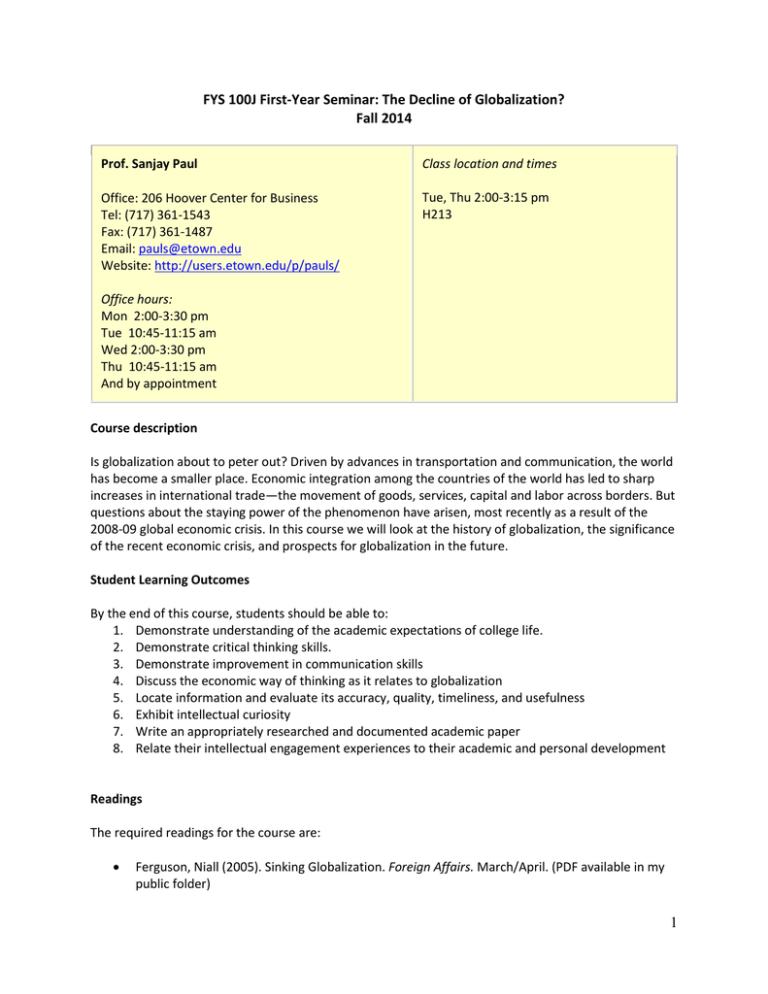
FYS 100J First-Year Seminar: The Decline of Globalization? Fall 2014 Prof. Sanjay Paul Class location and times Office: 206 Hoover Center for Business Tel: (717) 361-1543 Fax: (717) 361-1487 Email: pauls@etown.edu Website: http://users.etown.edu/p/pauls/ Tue, Thu 2:00-3:15 pm H213 Office hours: Mon 2:00-3:30 pm Tue 10:45-11:15 am Wed 2:00-3:30 pm Thu 10:45-11:15 am And by appointment Course description Is globalization about to peter out? Driven by advances in transportation and communication, the world has become a smaller place. Economic integration among the countries of the world has led to sharp increases in international trade—the movement of goods, services, capital and labor across borders. But questions about the staying power of the phenomenon have arisen, most recently as a result of the 2008-09 global economic crisis. In this course we will look at the history of globalization, the significance of the recent economic crisis, and prospects for globalization in the future. Student Learning Outcomes By the end of this course, students should be able to: 1. Demonstrate understanding of the academic expectations of college life. 2. Demonstrate critical thinking skills. 3. Demonstrate improvement in communication skills 4. Discuss the economic way of thinking as it relates to globalization 5. Locate information and evaluate its accuracy, quality, timeliness, and usefulness 6. Exhibit intellectual curiosity 7. Write an appropriately researched and documented academic paper 8. Relate their intellectual engagement experiences to their academic and personal development Readings The required readings for the course are: Ferguson, Niall (2005). Sinking Globalization. Foreign Affairs. March/April. (PDF available in my public folder) 1 Fukuyama, Francis (1989). The End of History? The National Interest. Summer issue. (PDF available in my public folder) Hacker, Diana and Sommers, Nancy (2011). A Pocket Style Manual (6th ed.) Boston, MA: Bedford/St. Martin’s. ISBN-13: 978-0312542542 Cohen, Harlan (2013). The Naked Roommate: And 107 Other Issues You Might Run Into in College (5th ed.) Sourcebooks. ISBN-13: 978-1402280283 Stiglitz, Joseph (2007). Making Globalization Work. New York: W.W. Norton & Co. ISBN-13: 9780393330281 Evaluation Your course grade will be determined as follows: Test 1 Tue, Sept. 16 20% Test 2 Finals week | Tue, Dec. 9, 11:00 am 20% Quizzes 10% Research paper 20% Class presentations 10% Discussion 10% OCLE Reflection paper 10% Total 100% Grading scale 93100 % 90-92 A A- 87-89 83-86 80-82 77-79 73-76 70-72 67-69 63-66 60-62 B+ B B- C+ C C- D+ D D- 0-59 F Tests are designed to test both your knowledge and your comprehension of the material covered during class and in your texts, as well as your skills of critical analysis. The final exam is cumulative. Quizzes will cover recently covered material. The quizzes will be unannounced. Research paper will deal with a topic on globalization. As soon as possible, but no later than Thu, Sept. 4, please visit me in my office to discuss your topic. The topic statement and preliminary bibliography are due in week three; the thesis statement, outline, and revised bibliography in week five; the initial 2 paper in week eleven; the oral presentations in weeks thirteen-to-fifteen; and the revised paper in week fifteen. Students will draw lots to determine the timing of their presentations. Form: The paper should be 10-12 pages long (exclusive of endnotes and any illustrations), typed, and double spaced, with one inch margins and twelve point, Times New Roman font. Please use APA format. Oral presentations should be 8-10 minutes long. Bibliography: You must use a minimum of 8 scholarly sources (books, journal articles, primary sources). If you have a question about the suitability of sources, including those on the Web, please ask me about it. Class presentations will include occasional presentations on global issues as well as an end-of-semester presentation on the research paper. Discussion is based on quality of participation, quantity of participation, and attendance. The discussion score includes attendance at and participation in out-of-class activities. The OCLE Reflection Paper is due in week fifteen. Two pages long, it will describe the significance of the Out-of-class learning experiences (OCLE), their relationship to the course, and their relationship to your college career. About the OCLE: An important component to the First-Year seminar is the opportunity for learning outside the classroom. Students must attend at least 7 different out of class learning experiences for a minimum total of 14 hours. Such experiences are offered throughout the semester on campus and include academic lectures, panel discussions, film discussions, Fine and Performing Arts events (concerts, art exhibits, plays), student development workshops and talks, etc. Your OCLEs should include a combination of student life offerings (career preparation workshops, for example) and academic programs. A list of activities is maintained in my public folder. Make-up policy Make-up tests and quizzes will be given again only under exceptional circumstances - e.g., very poor health. In all other cases, a missed test or quiz will result in a score of zero for that particular item. Late submissions of assignments and papers will be penalized. Attendance You are expected to attend ALL classes. You are responsible for class work, lecture notes, and reading assignments, whether you are present or absent. Courteous, attentive behavior is expected at all times. The use of cell phones (including texting), tablets and laptops is prohibited unless specifically authorized. Please arrive on time for classes and activities. If you don’t, you will be guilty of inflicting a negative externality on the class (which, as we will discuss on Day One, is not a good idea). Academic integrity Students are expected to adhere to the Standards of Academic Integrity at Elizabethtown College. In this course, you are not permitted to collaborate on the tests. In the case of assignments, however, you are allowed, and in fact urged, to discuss the exercises with your classmates before writing up the answers 3 yourself. Any breach of academic integrity will be dealt with in accordance with the policy stated in the College Catalog. Tips to avoid plagiarism: If you refer to ideas and information drawn from various sources, whether quoted directly or paraphrased, make sure you attribute them in a properly constructed citation (see APA format). Disabilities Elizabethtown College welcomes otherwise qualified students with disabilities to participate in all of its courses, programs, and activities. If you have a documented disability and require accommodations to access course material, activities, or requirements, you must: 1) Contact the Director of Disability Services, Lynne Davies, in the Center for Student Success, BSC 228, by phone (361-1227) or email daviesl@etown.edu. 2) Meet with me, the instructor, within two weeks of receiving a copy of the accommodation letter from Disability Services to discuss your accommodation needs and their implementation. Tentative Course Schedule (subject to change) Week 1 Dates 8/26, 8/28 2 9/2, 9/4 3 9/9, 9/11 4 9/16, 9/18 5 9/23, 9/25 6 9/30, 10/2 7 10/7, 10/9 8 10/14, 10/16 9 10/21, 10/23 Topics What is Globalization? Stiglitz Chapter 1 First Golden Age of Globalization Ferguson (2005), Stiglitz Chapter 1 Globalization and Development Stiglitz Chapter 2 The Reversibility of Globalization Ferguson (2005) 9/16 Test 1 9/18 Session on library resources and doing research (High Library) Globalization Since World War II Stiglitz Chapter 3 The Washington Consensus in the 1990s Stiglitz Chapters 2, 3 The End of History? Fukuyama (1989) 10/7 Fall break-no classes Intellectual Property Stiglitz Chapter 4 Globalization and the Environment Stiglitz Chapters 5, 6 Multinational Corporations Stiglitz Chapter 7 4 10 10/28, 10/30 11 11/4, 11/6 12 11/11, 11/13 13 11/18, 11/20 14 11/25, 11/27 15 12/2, 12/4 Wages and Labor Standards Stiglitz Chapter 7 Income Inequality and Debt Stiglitz Chapter 8 Global Institutions: IMF, World Bank, WTO Stiglitz Chapters 9, 10 Global Institutions: IMF, World Bank, WTO Stiglitz Chapters 9, 10 11/27 Thanksgiving-no classes Regional agreements: European Union, NAFTA, ASEAN Research paper presentations 16 12/9 Final exam 11:00 am 5

